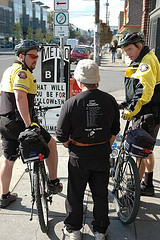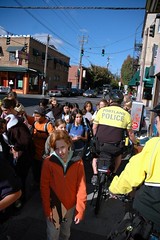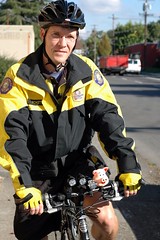Back in October I joined Officers Rob Quick and Robert Pickett of the Portland Police Bureau for a bike-along.
Pickett and Quick are on the Southeast Portland Bike Patrol whose enforcement boundaries cover everything from SE Hawthorne Blvd. to I-84, and I-205 down to the Esplanade.
I wanted to gain a perspective on the streets from a bike cop’s point-of-view, learn more about the bike patrol, get to know the officers a little better, and compare this experience to my previous ride-along in a patrol car back in August.
I first met Officer Pickett through his posts in the Portland Bike Forums during the “Creep named James” saga. He then showed up to the donut-eating contest at Carfree Day and most recently he was at Sunnyside School for Walk and Bike to School Day.
His actions and presence at these events show that Pickett is a true community police officer and it’s obvious he loves his job. Being on a bike, he tells me, enables him to not only be outside and enjoy the elements, but to establish relationships with people in the neighborhoods.

Pickett is a bit of a crusader within the ranks, fighting to keep the bike patrol unit alive. It’s only been up-and-running since May of this year and Pickett worries about funding and recruitment of officers to keep it going. At one point he testified on behalf of bike patrol in front of City Council. He said,
“The current Southeast Bike Patrol only happened because several officers really pushed it through. There’s always been a lack of interest, resources, and outside advocacy pushing for it…and it remains an indefinite program.”
I know city budgets are tight these days, but I was still disappointed at the lack of funding and interest in bike patrol units. To me, they seem like the perfect tool for effective community policing, which many Portland neighborhoods could use much more of these days. Pickett agrees,
“Being on bikes is a much more proactive policing style. We are so close the neighborhoods and the streets, that we often roll up on situations long before they have escalated. We also know the personalities of the people that live on the streets much better because of our close contact with them. This means we can tell when someone is a real threat to the community, or maybe they’ve just had too much to drink, or lost their medications. Because we know them, we can show the appropriate level of response.”
Unfortunately, the Southeast bike patrol is currently the only active bike unit outside the city center. According to Pickett, out of 900 total officers, there are probably only “a few dozen” who have ever done bike patrol.
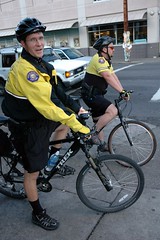 |
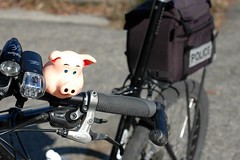 |
In addition to being physically and mentally able to ride a bike all day, bike patrol officers must go through special training. Pickett and Quick are both certified by the Law Enforcement Bicycle Association (LEBA) which started in Seattle back in 1987.
On average, bike patrol officers ride about eight hours a day. The level of physical fitness it takes to ride a bike all day might be one deterrent to getting more cops interested in the program, but for Officer Quick — whose competed in a few triathlons and rides into work each day from east Portland — it’s no problem.

Pickett has never entered a competition, but for a few months in 2000, he worked as a bike messenger for Transerv in downtown Portland. When he told me that he jokingly said, “Does that make me a sell out?”
Combined with his messenger experience, I bet Officer Pickett would be great at cyclocross. He says they’re not permitted to shoot their gun from the saddle, so they’ve been trained to jump off their bikes at full speed (I should have asked to demonstrate for the camera).
His past job as a messenger adds to my feeling that Pickett doesn’t fit the typical cop stereotype. Towards the end of the bike-along, we came across a homeless guy with a pending arrest warrant. Pickett seemed pensive as he came over to brief me on the situation.
He relayed his frustration about this situation because this is a typical modus operandi for many street people. They just go in-and-out of the system, never finding help, and never getting off the street…but Pickett had no choice, he had to honor the warrant and repeat the whole process once again.
Noticeably exasperated, he expressed regret and said that sometimes he feels like he’s just part of the system. He wishes he could do more to solve the problems he encounters, instead of just processing them.
During the course of our patrol that day we chatted with several business owners, questioned several people living on the street, and ran into a group of school kids (they loved Pickett’s pig bell (in photo above)). The whole time I kept thinking how great it would it be if we had many more bike-mounted officers in Portland.
As the number of cyclists in Portland increases, we need more officers with real, on-the-bike experience.
I just wish there was more interest and enthusiasm from the Police Bureau for bike-mounted patrols. Not only are they good for community relations and policing, but they also give cops a valuable perspective on traffic safety issues from a bicyclist’s point-of-view.
Thanks Officers Pickett and Quick for letting me tag along. I’m sure I’ll see you out on the streets next time I’m in your neighborhood.
